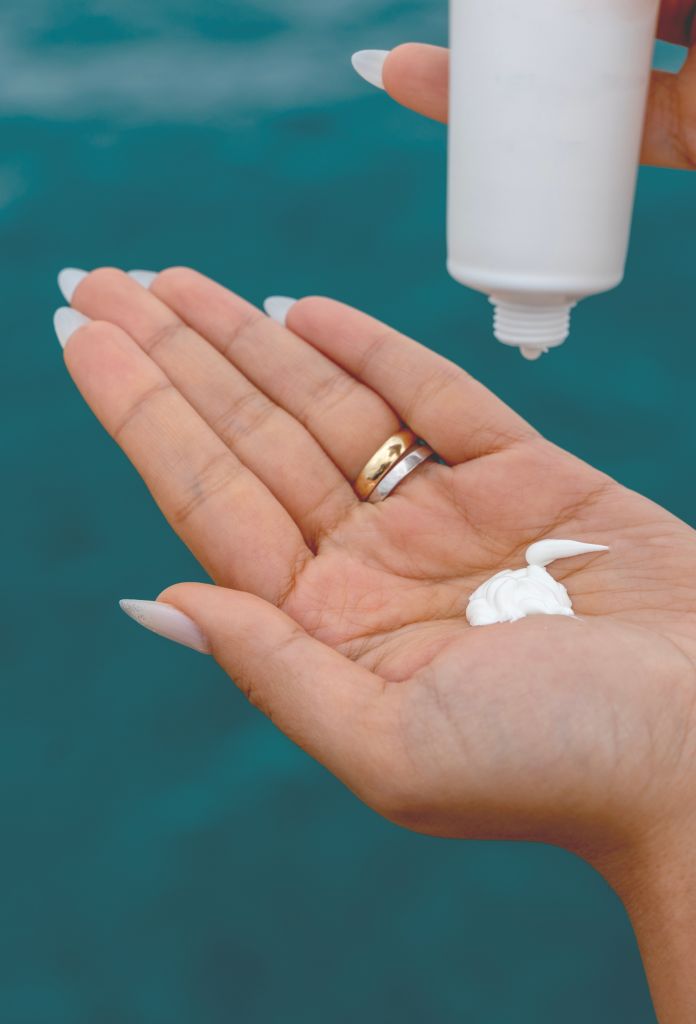Sun protection is an essential part of skincare, and protecting against harmful UV rays cannot be overstated. However, choosing the right sunscreen can be challenging because there are many different filters and ingredients, each with varying effects and safety profiles. In this blog post, we aim to help you understand the differences between various sunscreens and provide you with the tools to independently evaluate the ingredients in sunscreens. We will explain the different types of UV filters, their advantages and disadvantages, and the latest scientific findings about their safety and effectiveness. Our goal is to inform you about which filters are safe and effective and why some may be problematic. This way, you will be well-equipped to make informed decisions for your skin’s protection and find the optimal care for your individual needs.
Why Are Some Sunscreen Filters Problematic? Some older chemical UV filters can act as endocrine disruptors and disrupt hormonal balance. This means they can penetrate the body and mimic or block hormonal signals, which is particularly concerning for pregnant women and young children. Numerous studies have shown that these substances can be detected in human tissue, including breast milk.
Scientific Studies:
A Swiss study from 2010 found old UV filters in 85.2% of breast milk samples (EWG)
This study examined breast milk from 54 mothers between 2004 and 2006 to measure various environmental chemicals. They found that persistent pollutants like PCBs and pesticides were present in all samples, while cosmetic-related chemicals like UV filters and parabens showed more variation. UV filters were found in 85.2% of samples, often linked to the use of specific cosmetic products. Levels of PCBs and pesticides were similar to those in other parts of Europe, with some exceeding US safety limits. The research highlights the need to study complex mixtures of chemicals to understand exposure risks better.
A Spanish study from 2018 discovered high concentrations of oxybenzone in breast milk samples (Clinikally).
- UV filters (UV-Fs) are chemicals found in many products like sunscreen, plastics, and fabrics to protect against sun damage. Concerns about these chemicals have been growing, especially regarding their effects on young children. This study created a new way to measure 11 different UV-Fs in breast milk. Testing 79 samples from mothers in Barcelona, they found that 24% contained UV-Fs, mostly from sunscreen ingredients like oxybenzone (BP3) and its byproduct 4DHB. They also found these chemicals in the plastic milk containers, and estimated that babies were ingesting about 69.1 µg of these chemicals per kilogram of their body weight each day.
Filters We Advise Against Here are some problematic filters we advise against using:
- Avobenzone (Butyl Methoxy Dibenzoyl Methane) – UVA1, UVA2 Problems: Becomes unstable under UV light, can cause skin damage, and is systemically absorbed.
- Enzacamene (4-Methylbenzylidene Camphor) – UVB Problems: Hormonal disruptions, harmful health and environmental impacts.
- Homosalate (Homomethyl Salicylate) – UVB Problems: Hormonally active, disrupts hormonal balance, and is easily absorbed.
- Octocrylene (Octocrylene) – UVA2, UVB Problems: Can cause allergies, high absorption rate, and potential hormonal effects.
- Oxybenzone (Benzophenone-3) – UVA2, UVB Problems: Endocrine disruptor, causes hormonal imbalances, detected in human tissue.
- Padimate O (PABA, Ethylhexyl Dimethyl) – UVB Problems: Known for its allergenic properties and can cause phototoxic reactions.
- Phenylbenzimidazole (Ensulizole) – UVB Problems: Potential hormonal effects, allergic reactions.


Recommended Sunscreen Filters In contrast, there are safer alternatives that we recommend:
- Tinosorb M (Methylene bis-benzotriazolyl tetramethylbutylphenol, Bisoctrizole) – UVA1, UVA2, UVB Advantages: Comprehensive protection, photostable.
- Tinosorb S (Bis-Ethylhexyloxyphenol Methoxyphenyl Triazine, Bemotrizinol) – UVA1, UVA2, UVB Advantages: Broad spectrum, very stable.
- Uvasorb HEB (Diethylhexyl Butamido Triazone, Iscotrizinol) – UVA2, UVB Advantages: Excellent UVB filter, easily combinable.
- Uvinul A Plus (Diethylamino Hydroxybenzoyl Hexyl Benzoate) – UVA1, UVA2 Advantages: Effective against UVA rays, light stable.
- Uvinul T (Ethylhexyl Triazone, Octyl Triazone) – UVB Advantages: Strong UVB protection, water-resistant.
- Octisalate (Ethylhexyl Salicylate, Octyl Salicylate) – UVB Advantages: Enhances other UV filters, skin-friendly.
- Titanium Dioxide – non-nano – UVA2, UVB Advantages: Mineral filter, environmentally friendly.
- Zinc Oxide – non-nano – UVA1, UVA2, UVB Advantages: Comprehensive protection, ideal for sensitive skin.
How to Choose the Right Sunscreen When choosing the right sunscreen, consider several factors:
- Skin Type: Sensitive skin often benefits from mineral filters like Titanium Dioxide and Zinc Oxide, which are less irritating.
- Activities: For water activities, water-resistant products like Uvinul T are particularly suitable.
- Age: Sunscreens without hormonally active substances are preferable for children and pregnant women.
- Skin Condition: For skin problems like acne, non-comedogenic products can be helpful.
Why RoseKin Cosmetics? At RoseKin Cosmetics, we exclusively use safe and effective sunscreen filters. Our products contain none of the problematic filters that act as endocrine disruptors or have harmful health and environmental effects. Our formulations are carefully developed to provide maximum protection while being skin-friendly.

Download our free sunscreen guide now and protect your skin with the best information and products!
Remember: Any sunscreen is better than none. In addition to using sunscreen, you should follow these general rules:
- Wear protective clothing, hats, and sunglasses.
- Stay in the shade or indoors during peak sun hours (approximately 10 AM to 4 PM).
- Use enough sunscreen and reapply regularly, especially after swimming or sweating.
Sun protection is essential for skin health and can help reduce the risk of skin cancer and premature skin aging. With the right information, you can make informed decisions and choose products that are both safe and effective. Protect yourself and your skin with the best available information and products from RoseKin Cosmetics. Download our guide and stay informed!
By consistently using sunscreen and following these simple rules, you can optimally protect your skin and maintain its health in the long term. Our comprehensive sunscreen guide offers you detailed insights and valuable tips so that you are always well prepared. Use the knowledge from RoseKin Cosmetics to make the best decisions for your skincare. Stay safe, stay healthy, and enjoy the sun with peace of mind. Download our guide now and take the first step toward healthier skin!

